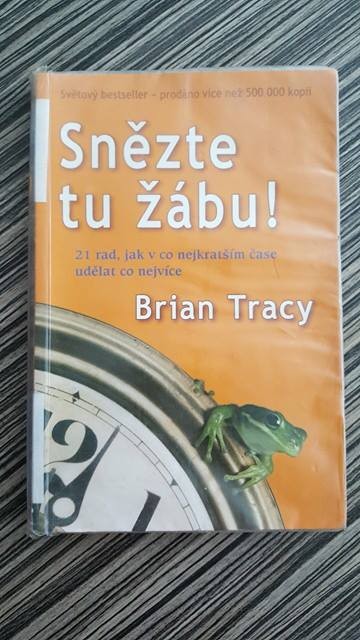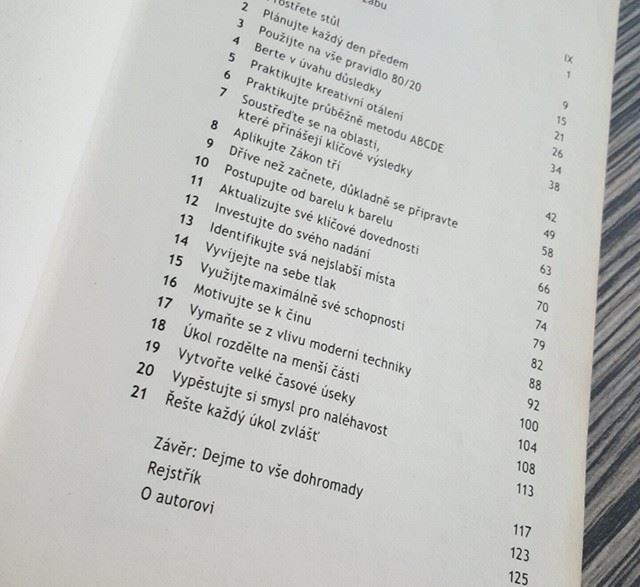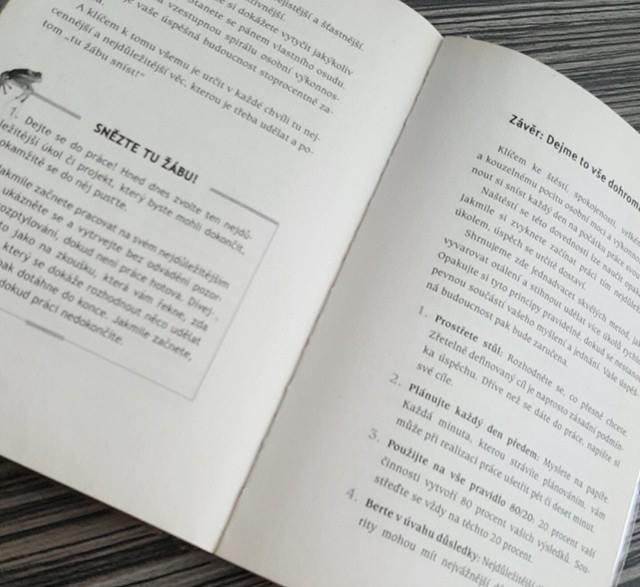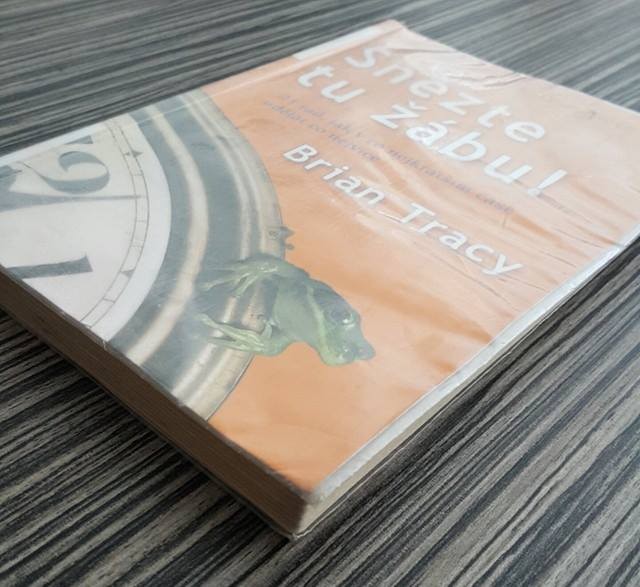Brian Tracy - Eat that frog!
Brian Tracy, Eat that frog! – 21 Ways to stop procrastinating
Today I decided to write about an amazing book my mum found – Eat that frog (21 ways to stop procrastinating).

I don’t like crazy promises like “Fifty advices to successfully lose weight” or “Thirty tips to learn English” or “Twenty tips to become a totally different person”. That´s why the name of the book “Twenty one ways to stop procrastinating” did not seem attractive to me. Moreover, “Eat that frog” – seriously? What the hell is that? I don’t want to eat anything. This book was recommended by friend of my mum to her and now we are both grateful for it. Normally, I borrow the books from the library and I buy only the ones I am really interested in and I cannot live without. I buy books only if I am sure that I will read them again. The conclusion is that this group (books I bought) definitely includes Eat that frog!
The main point is already explained in introduction. The author of the book is trying to explain what we already know but it is difficult to realize it: we have too much work, too less time and we try to manage doing everything but tasks and things to do are pushing us. We are not able to complete all of them! Never. The solution is setting the priorities, choose the most important task and start working on it. Then, you can complete it really fast and properly. It will definitely have the biggest influence on success – bigger than anything else!
And how is it with the frogs? They say that Mark Twain once said that if we eat one alive frog every day in the morning, we can then have a nice day with awareness that nothing worse would happen later. I think that there is something true about it. But it is even worse – if you have two "frogs" to do, you have to start with the worse one – the author advices. It made me laugh a lot. Unfortunately, there are many rules like this for hard-bitten humans: if you really have to eat a frog alive, there is no sense in sitting and staring for a long time. The most important part is that before we start eating frogs, we have to settle the goal. In other words, it means that we have to be sure of what we want. The main cause of lack of motivation and postponing things is mess and lack of clarity in what we really want to do. It is so hard to make it clear what we exactly want to achieve! In the book, he says we should set the goals and write them down…
The most wasted time is doing something well that it is not needed to be done. This sentence scared me a lot because it is so true. Why did I not realize it before? It sounds logical! I think that I am good at many things that I do often, but I don’t need to do them!

It is really necessary to set the goals, but also priorities of these goals. Every day the goals should be reconsidered to accomplish the most important ones!
The author even gives a detailed guide of how to eat the biggest and the ugliest frog! Firstly, we should cut it into pieces and start with the first piece. I think that is it a good idea to compare tasks to a frog! I even got used to the fact that I have to survive eating a disgusting frog every day in the morning!
Besides general knowledge about writing a list, I started to like the rule 80/20. This rule says that twenty percent of our activity creates eighty percent of our results. We often see people who are busy all the time but they are not actually successful. Therefore, we should resist the temptation of getting rid of the easiest tasks and we should always start with the hardest ones.
Reconcile with the fact that we are not able to do everything. We are humans. Something must be postponed! Even if we finished everything we would probably find another thing that needs to be done. We can start dividing tasks into two categories – “it should be done” and “it needs to be done”. The key thing to make it work is forcing ourselves to start with the most important task and survive until we are finished. If we get used to proceed like this and we are focused on it, we will be more efficient than two or three people all together.
The writer indicates that 85 percent of our feeling about happiness is related to good relationships with people, mainly with the closest ones and members of our family. It is decisive how much time we spend with these people who we love and who love us. This finally explains the situation that wherever I move (to England, France, Amsterdam), I am totally unhappy in the beginning – because I don’t know anybody there. For me, it is essential to be surrounded by people I feel good with – especially if I am without my family…
Another important things: “at work, we should devote all time to working”. We need our time to be in balance. Each minute spent with co-workers will be missed to finish our work that we have to finish anyways. Finding a balance between working and life at home is not an easy task – we still need to work on it…
Next one: “Don´t stop learning”. The writer made me think about the quote of basketball leader Pat Riley: “If you are not trying to improve yourself, you are getting worse”. Recommendation: Read a lot of literature in your area at least one hour per day. Get up earlier than you need in the morning. Go to courses. The more you learn, the more you know and the more confident you feel. I think there are many interesting ideas.
People have the most valuable thing – the ability to learn. We can lose everything but if we are able to learn new things and earn money, we can get everything back easily – maybe even more than before. Another rational recommendation: "Do what you love". Later on, there is an identification of the weakest points. Let's put pressure on us. We have to choose our frogs and force ourselves to fight against them in a good order. Not to wait until someone does it instead of us!
Let´s have enough sleep and take care of our health. It is easy to say it but we often ignore these issues. Too much work can cause lack of productivity. We have to solve the tasks separately. Don´t waste your time.
One example from the book is: "Now here’s an important point. You cannot manage time, you can only manage yourself. So time management is really life management. It’s really personal management. It’s really the management of the sequence of events in your life. It’s the ability to choose what you do first, what you do second, and what you do later if at all. And in this ability to choose is your entire life. When you choose the most important thing and you choose to do that first, and choose to do that rather than anything else, you immediately put your life onto the fast track. In fact, you can actually double your productivity, performance and output in one day simply by changing your order of choices in the way you use your time".

To sum up, Brian Tracy is one of the biggest expert in area of self-improving and using our potential at maximum. He studied economics, history, business, philosophy and psychology. Moreover, he is the top selling writer of over fifty books that were translated into dozens of languages. He also produces audio and video learning programs. On top of that, he often organizes talks and seminars on Leadership, Selling, Self-Esteem, Goals, Strategy, Creativity and Success Psychology. Regarding his family, he is married with four children. It is unbelievable but he travelled and worked in over 90 countries and he also speak four languages.
In my opinion, I would admit that it is true that he is amazing. I will do my hardest to listen to his advices and recommendations and I expect my life to be even more perfect than it is!

Photo gallery
Content available in other languages
- Español: Brian Tracy - ¡Tráguese ese sapo!
Want to have your own Erasmus blog?
If you are experiencing living abroad, you're an avid traveller or want to promote the city where you live... create your own blog and share your adventures!
I want to create my Erasmus blog! →







Comments (0 comments)